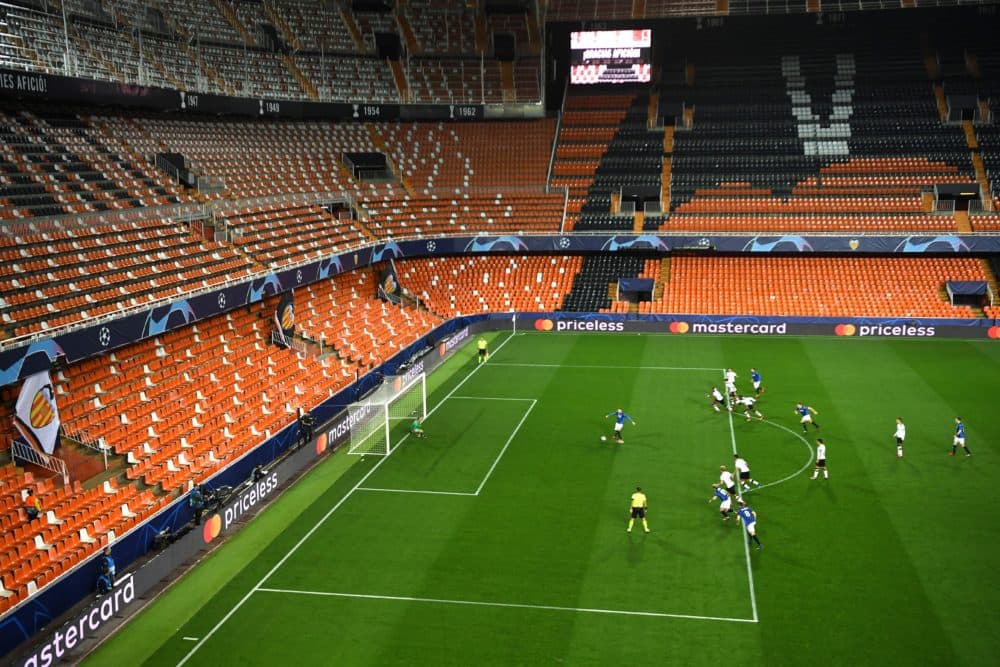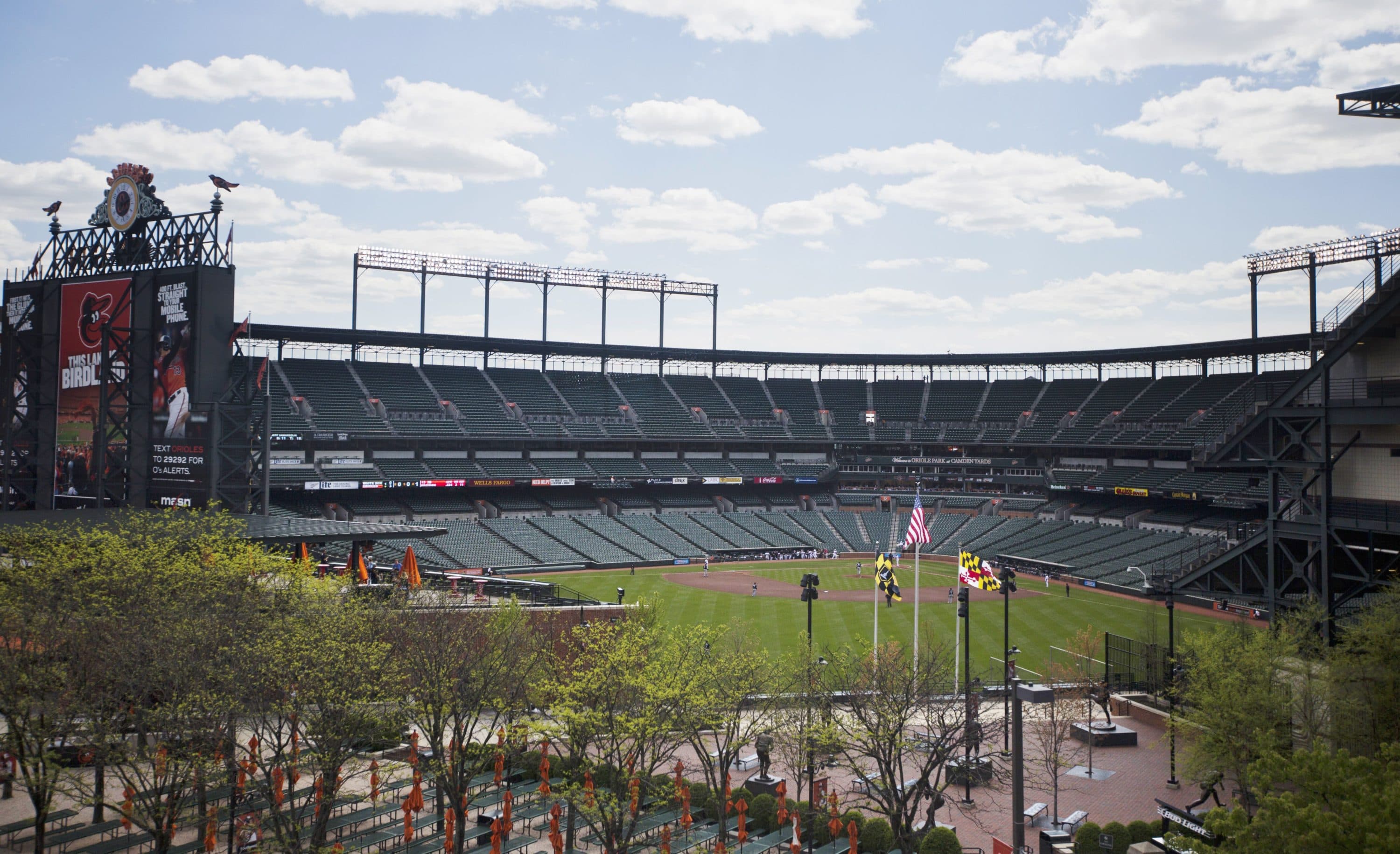Advertisement
Waiting For A Vaccine? The Uncertain Return Of Sports Fans

The XFL filed for bankruptcy this week, after the COVID-19 pandemic forced the suspension of play just five games into the league’s much-anticipated return.
And the idea that fans will come back to their seats quickly and without reservation when sports do start up again took a hit last week, when Seton Hall University released the results of a survey, in which 72% of respondents said they won’t return to live sporting events until there’s a vaccine for COVID-19. Experts say that day is likely 12-18 months away.
For more on that, we spoke with Dan Rascher, Professor and Director of Academic Programs for the Sport Management Program at the University of San Francisco and Kenneth Shropshire, CEO of Arizona State University's Global Sport Institute.
KG: OK, let's first talk about the study itself. It was a relatively small sample, just 762 respondents. They were asked 10 questions. Ken, was this a well-designed, well-executed survey?
KS: Oh, you're not gonna get me to hate on an academic colleague. It is done as many surveys are. You know, how big can you get? If you could ask 330 million people in the country, that would be a much better path than asking 750 or 1,250, or whatever the number might be. And, really, I think more than anything else, the way the press put it out there might be what's most confusing to folks.
If you're not a sports fan, you were saying that "I'm not going back," but you were never there in the first place. So the real number the press should have had out there, I think, is 61% or something like that, in terms of sports fans that said they would not come back.
KG: Totally fair. So should we actually take people at their word when they say they won't return to sports venues until there's a vaccine?
DR: You know, I've looked at these sorts of situations in the past. And, if you think about the baseball strike a number of decades ago, fans were essentially saying the same thing: that they wouldn't come back. Now, that wasn't because of a health issue. That was because they were mad, and they were going to take it out on the baseball teams and the players and the owners. And then, in the end, of course, the research shows that they did come back. And we've seen that — many situations where these surveys show that fans feel a certain way, [then] when they have to put their money where their mouth is they actually tend to show up at these sporting events.

KG: So, Ken, if it turns out that fans are saying one thing in a survey and another thing if their buddy says, “Hey, I've got front row seats for the NBA Finals, want to come?” What do we make of the fact that what they say in the survey and what they do might not be the same?
KS: People that are being surveyed answered the question honestly in the moment, I think, for the most part. I think people just don't know, until the moment of truth, what the answer to many of these types of questions are going to be. And Dan’s so right. You see this all the time. "I'm so mad at the NFL players for striking in ‘82, I'll never go back." And then, you know, it's now trying to be a $25 billion sport.
DR: I mean, I do think this is a different situation. I think there's a lot more unknown here. I mean, there's a fear for people's health. And so that may be different. And I think, answering honestly as I sit in my room, am I going to be the first guy in the gate? Probably not. But, of course, I will end up going back to sporting events. And I think that time lag is really what's going to be interesting. How long will it take for people to take to fill those arenas?
KG: One of my colleagues got an email this week from something called the "Ticketmaster Research Team," asking what safety precautions she'd like to see at events, once events have started up again. And from the questions she was asked, it sounds like the ticketing industry — and therefore probably the sports industry — is taking this study pretty seriously. Ken, should they be worried?
KS: Oh, for sure. I think the timing is the big issue, and how rapidly people will come back. And I heard people down here in Phoenix — some of the people at the Diamondbacks and elsewhere — talking about hand sanitizers and visibly wiping seats down and the sorts of things that they're anticipating that they'll need to do to provide comfort, and for genuine security, for the fans. So, no, I think the industry is very wise to be mapping this out. And not just for the marketing/PR standpoint, but also for real health.
KG: Yeah, I think of a place like Fenway Park, which is a place I absolutely love. But, man, those seats are small.
KS: Yeah, there's not a lot of social distancing at Fenway. That's correct.
KG: I mean, none of us know what's gonna happen here. It's possible that the CDC will recommend that there be no fans at sporting events until there's a vaccine. In which case, this whole conversation will likely have been kind of moot. But, in the event that medical professionals tell us it's safe to go back, what does this poll tell you about what's actually going to happen next?
DR: You know, I wouldn't be surprised if it is gradual, in the sense that — in order to make people feel safe — a league decides to limit the capacity to, you know, half or a third of the number of seats. And maybe that would make people feel comfortable. And then you go a few weeks doing that, and those folks are not getting sick — hopefully we have more testing by then — then maybe they can start to open it up more.
"In many situations where these surveys show that fans feel a certain way, when they have to put their money where their mouth is, they actually tend to show up at these sporting events."
Professor Dan Rascher
KS: Yeah, I'm there with Dan. And, if you focus on the field of play, that's the other issue, and maybe even the dominant issue. So we've got ourselves a bit of a journey. But, in the end, it will come back. You know, the 1918 pandemic and all these other times, we've come back with much less technology and much less medical wherewithal. And, you know, I'm the 65-year-old guy — I am the last guy back in the stadium. I mean, I'm gonna wait and see. I think it's demographic-based as well. I can see kids getting back out there pretty rapidly.
KG: Let's talk just for a second about what's at stake here. Because if there is a long layoff before fans get back in the stands, the NFL would probably be OK, but what about other leagues?
KS: You mean like the XFL, for example?
KG: Right, right.
KS: Yeah, well, that's the problem that we could see. The surprise there was, you know, we thought there was three years worth of funding. But you’ve got to look to the funding source, which is the WWE, which wants to survive, too. And, if you can offload an expense, and the expense happens to be an entire league, that's the kind of thing that can happen. So we'll see. And it's all going to be a chain reaction kind of thing, too. The media enterprises, will they continue support? Sponsors, will they support? So the fans are one segment, but there are a lot of dollars that come from a lot of different locations.
DR: Yeah, exactly. And the major sports leagues have other sources of revenue. Maybe they'll come back if they can get the players and just earn media revenues for a bit and sponsor revenues before they fully earn ticket and concessions revenues and so forth.
I mean, I'm worried about the minors. I mean, they don't really have much media revenue at all. And so they need fans in the stands. You know, the hundreds of minor league teams out there, I wouldn't be surprised if many of them end up going under — or at least kind of mothballing everything until every fan can come back in the gate, or they can at least draw a minimum number of fans.
Ken Shropshire is the CEO of Arizona State University's Global Sport Institute. Dan Rascher is the Director of Academic Programs for the Sport Management Program at the University of San Francisco.
This segment aired on April 18, 2020.
